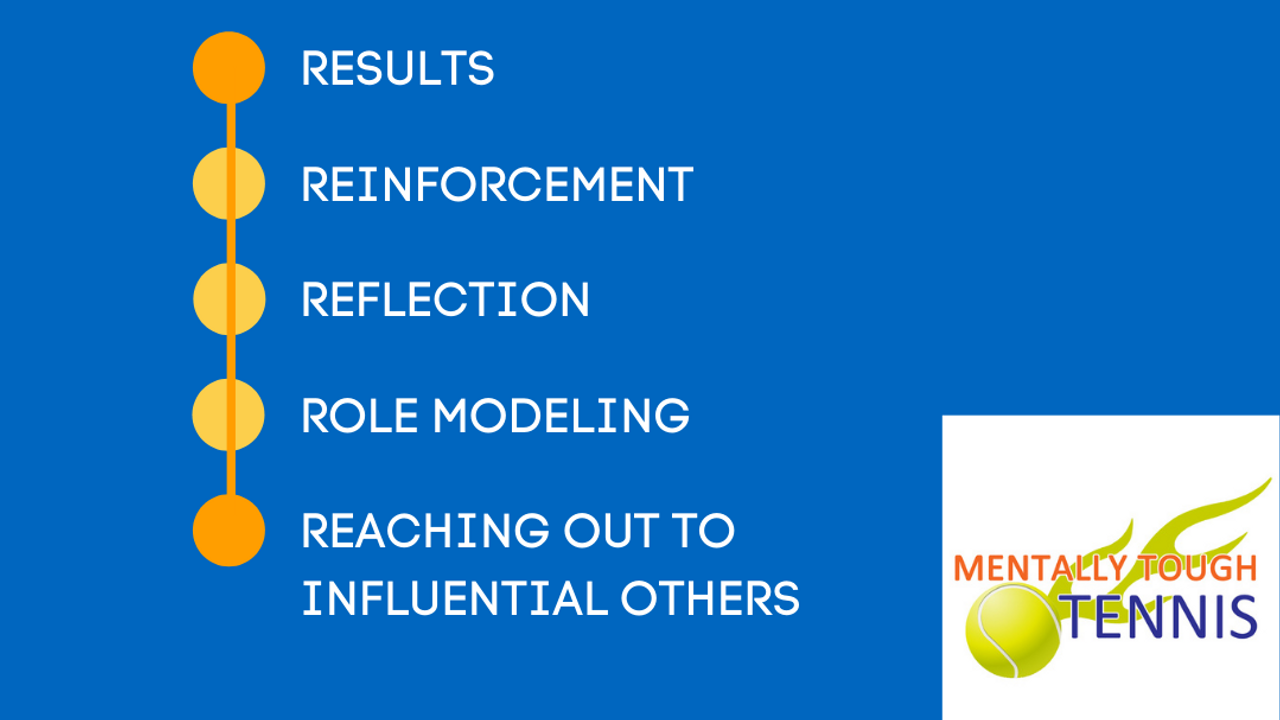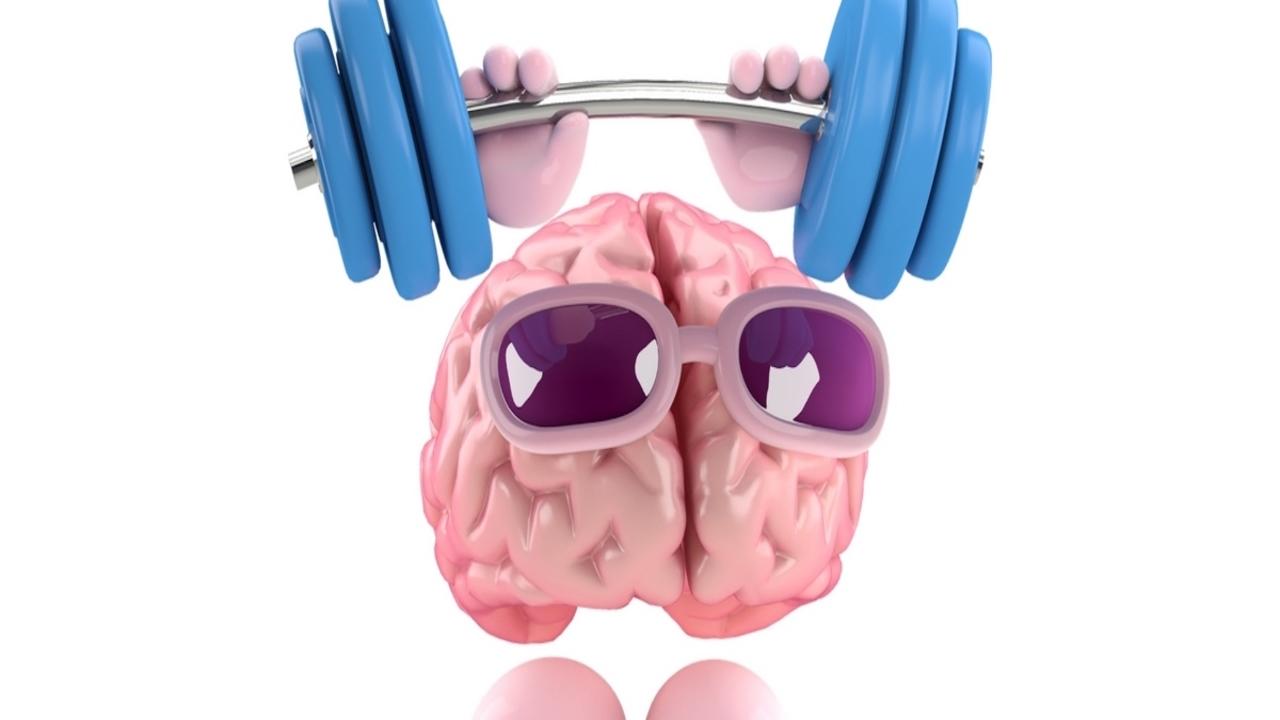WELCOME TO OUR FREE ARTICLES, VIDEOS, AND RESOURCES
Would you like us to send our best free tips, tools, and special offers straight to your inbox?
The 5 R’s to Positively Shape Players’ Mental Experiences Over Time

If you've been following my communications for a while you'll be aware that I believe trying to control unintentional difficult thoughts (e.g., outcome thoughts, negative thinking) and emotions (anxiety, frustration) during matches is detrimental to long term mental toughness.
What we do want to do however is communicate (if you're a coach or parent), and reflect in ways that lead to more helpful mental experiences over time.
Here are 5 ways we can do this:
1.) Results
The most powerful way to improve internal experiences in a given performance situation when encountered in the future is to commit to desired actions now.
For example, when a player performs well while experiencing difficult internal states, this positive performance outcome will likely lead to more adaptive interpretations of that situation when experienced again.
The player will also implicitly learn from this experience that desirable internal states are not required for effective...
Set Expectations LOWER to Improve Mental Toughness...
Invest 5min of your day right now in watching this video if you want to become a better coach, tennis parent, or player....
Anthony
A Great Activity to Help Players Respond Better to Difficult Match Related Thoughts :-)
If a player's tendency to compete poorly stems from listening to the difficult passengers that often get on our bus during matches (or maybe even trying to kick them off the bus), this activity called ‘Thanking the Passengers’ is very helpful when practiced regularly.
Step 1.)
As soon as a player recognises that they’re no longer committing to helpful actions during a match (such as your strategy or helpful cues), they should scan their mind for any difficult passengers commenting on the situation.
Step 2.)
Typically we find that the nervous passengers say things like “you’re going to mess it up/don’t lose from here/don’t miss”, the frustration passengers say “that’s not good enough/that’s not fair”, and the helpless passengers say “there’s nothing you can do”. When players notice what their difficult passengers are saying (or yelling), they should simply thank them for their...
Everything Players Need to Know About Developing Mental Toughness in a 2 Minute Story About a Bus Driver......
Amazing as it sounds, everything players need to know about developing mental toughness can be learned in a 2 min story about a bus driver...
Each day the bus driver selects his bus route and tries to drive his bus where it needs to go. The more the bus driver is in touch with why it is important to him to do his job well, the more motivated he will be to drive well (Key 1: Purpose).
To increase the chance of a successful trip the driver puts his attention on the road in front of him/her (Key 2: Present Moment Attention) and takes actions of steering and pressing the accelerator and brake in a way that takes the bus in the right direction (Key 3: Committed Action).
The bus driver stops the bus to pick up passengers at each bus stop. Different passengers get on depending on the stop. The driver doesn't have a say in who gets on the bus, everyone is welcome as long as they pay their money. Therefore, sometimes good passengers get on the bus and...
How Joao Monteiro Became the Biggest Improver in College Tennis…

In 2015, I was privileged to be invited by Head coach Jim Thompson to work with the Virginia Tech men’s tennis college team…As part of this, I worked with the players directly and Assistant Coach Stephen Huss also participated in a PhD project throughout the season designed to help develop his skill in coaching mental toughness…During the season the returning players were able to achieve an average 25% improved singles win rate and an all-time best school ranking…
And one of those players was Joao Monteiro…
Joao completed his college journey in May as the most improved player in College tennis…
In this post I want to give you a summary of Joao's story which Coach Huss first told a couple of months ago....But also give you a glimpse of how Joao's development was in part a result of him embracing my 4A Cycle process and the VT coaching team's improved skill in helping him develop mental toughness…
Joao’s Freshman...
SPECIAL REPORT: Control Traps Explained...

About 15 years ago I was frustrated and helpless regarding what I thought were my own failings in trying to help players achieve ‘ideal performance states’…But after some great mentoring from a psychology supervisor of mine, I underwent a process over several years of discovering that the ‘ideal performance/zone state aim was deeply flawed…As well as discovering the better way to develop mental toughness for tennis.
And I’m going to share with you examples of how to coach this better way in just a minute…
But first I have to explain how the field of sport psychology has failed us with some misinformation about how to help players become mentally tough.
How Sport Psychology Has Failed Us…
For a long time the field of sport psychology has mistakenly held on to the view that the path to playing mentally tough tennis involves the ongoing search for the zone.
This means that we’ve usually been taught that...
3 Ways Brain Science Can Help Player Development...

Let’s look at 3 examples of how a better understanding of the brain can be applied to promote player development.
The 3 Examples…
1.) Aerobic Exercise Before Practice
Aerobic exercise affects the brain like fertilizer on grass creating ideal brain conditions for growth and learning.
So a short period of exercise prior to practice boosts player learning during practice.
And to magnify these benefits we can use pre-session exercise to develop players’ concentration, self-awareness, and emotional capacities.
To do so ask them first try to maintain attention on a particular aspect of exercise completion such as their breath, or the physical discomfort in their bodies.
Then the aim is to notice as quickly as possible when their attention has wandered, and refocus it on their chosen target.
Additionally, when players choose to maintain attention on and practice tolerating physical discomfort during exercise this strengthens brain regions responsible for...
The Mental Toughness Fundamental Players Almost Always Overlook...

One of the simplest and most important things players can do to boost motivation and focus for practice and matches is to take a minute to reflect on a few vital questions before hitting the court...
When players create the habit of doing this it usually adds up to big benefits over time.
But unfortunately, it rarely happens...
In the rush to get out there and hit balls players miss out on the opportunity to reflect on what they are about to do, and why it is important to them to do so...
For example, players need to stop and reflect for a short time on whether the aim of the activity they are about to do is to win; improve; or both...(We call this the Performance Aim)
So in practice more often than not the focus is on improvement...
Whereas in matches, the goal might be to win, or improve, or both (during the developmental years too many kids focus solely on winning instead of improving skills that will help them become the best player they can be).
And if the...
Varying Time Between Practice Rallies to Develop Competitive Skill...
Typically, when players miss a ball during practice, they tend to feed the next ball in quite quickly (generally a couple of secs) without intentionally refocusing before the start of the rally.
When players do this, however, they miss out on a great opportunity to develop basic competitive skills.
Here are 2 activities I complete with players regularly to help them practice intentionally refocusing and committing to a helpful process for each new rally.
Activity 1: 5 Secs Between Rallies
When players miss a ball they must take approximately 5 secs before they are allowed to feed the next ball
Players are instructed to use this time to ensure that they are explicitly focused and committed to a helpful process before starting the next rally.
The Benefit: Although players actually hit less balls during a session, they will actually hit more with quality during the same amount of time.
Additionally, this activity helps players partially practice their discrete...
Promoting Player Competitive Skills During Serve/Return Practice...
Serving and returning are obviously 2 of the most important areas of the game...
But serving/returning practice can be quite time consuming.
So it's important that players find ways to develop other skills while practicing serves/returns.
With this in mind, here are 3 serve/return activities that also promote player competitive skills/mental toughness simultaneously (you can also watch the video above to see examples of me completing the activities with 2 players above...
1.) Serving Set Play
In this activity players play service games/sets while hitting only serves (where if they make a first or second serve they win the point, and if they double fault they lose the point).
To add difficulty to the task:
i.) The player nominates the 3rd of the service box (tee, body, wide) that they will hit their serve into and if they miss the correct third of the service box it is considered a fault
ii.) The player starts each game behind (e.g., 0-15, 0-30, 0-40)
#So, for a player...
